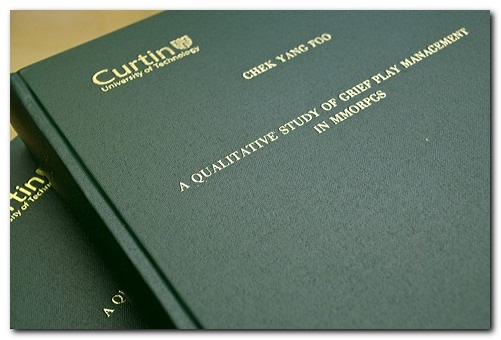I’m doing lot of posts recollecting, especially important now that I get older and I’m worried that my brain cells degrade further LOL. This will be a long ten part series on the Ph.D program, so do bear with me.:)
To be honest, doing a Ph.D wasn’t really something on my long term radar until quite late. I’d done well enough for my Master degree even though the time I took to complete was stretched – 4 years as my first attempt at the dissertation project turned abortive – and I was quite happy not to return to the books ever again.
However, a turn of events took place at the institution I was teaching at in late 2001 led me to start considering other opportunities. I met my Godmother for a long dinner, during which she had some words of advice: that if I was going to be in tertiary education long term, I had to do a Ph.D. Not just a doctoral program, but a Ph.D by research.
There are a couple of ways to get into a Ph.D program. You could always apply cold-turkey to the institution, and hope that as your project proposal gets passed around the faculty, there’s someone who’s free or likes your proposal enough to agree to take you in as a doctoral student. The better way though I believe is to solicit for your supervisor on your own first. Because if there is a professor who agrees to take you in, that’s your green card. The rest of it – i.e. the application – is just paperwork.
 I knew my interest area early on: social studies into virtual worlds, and largely because of my experiences starting up and running guilds and communities in MMORPGs. At that point of time (in 2001), MMORPGs were starting to pick up steam and appeal even though they didn’t see the huge player subscription numbers we do today – e.g. World of Warcraft’s 11.5 million players – but it was still a relatively new area of studies. There were a few persons and research project groups looking into player demography using quantitative techniques, and others in addiction, communication patterns, player-generated content and the like. I do not enjoy, personally, quantitative research techniques, so my leanings were towards exploration, interpretivistic investigation and qualitative techniques of interviewing, observation, and field studies.
I knew my interest area early on: social studies into virtual worlds, and largely because of my experiences starting up and running guilds and communities in MMORPGs. At that point of time (in 2001), MMORPGs were starting to pick up steam and appeal even though they didn’t see the huge player subscription numbers we do today – e.g. World of Warcraft’s 11.5 million players – but it was still a relatively new area of studies. There were a few persons and research project groups looking into player demography using quantitative techniques, and others in addiction, communication patterns, player-generated content and the like. I do not enjoy, personally, quantitative research techniques, so my leanings were towards exploration, interpretivistic investigation and qualitative techniques of interviewing, observation, and field studies.
Unfortunately, there weren’t many persons back then who could supervise my research area. There were a few based in the United States and in Europe, but none I could find in Singapore or Australia. But my application to Curtin University of Technology went ahead on account of the fact that I would be working again with someone I knew: my Master degree’s research project supervisor, Dr. Heinz Dreher. He was experienced in qualitative techniques, and also in the data gathering and assessment approaches in this bracket of methods.
So, as soon as the supervising committee was put together, the paperwork portion went along speedily, and I was officially registered into the faculty in September 2002. Unfortunately, I couldn’t pack up my bags, leave Singapore and head off to Perth right away. I’d taken an institution scholarship for my Master degree with the bond to expire in May 2003. Through clearing leave, goodwill on the part of that school’s management for (I hope) one of their long-time staff who was finally moving on, I was released from work in Feb 2003.
In the months before leading up to my departure that month, I did a bit of ground work, got my materials together, picked up whatever reference books I could buy first in Singapore, and mostly bit my nails in anticipation for a study program that could take me anywhere between 4 to 6 years.
The second and next post in this series will be on Departure & Arrival.:)
Recent comments